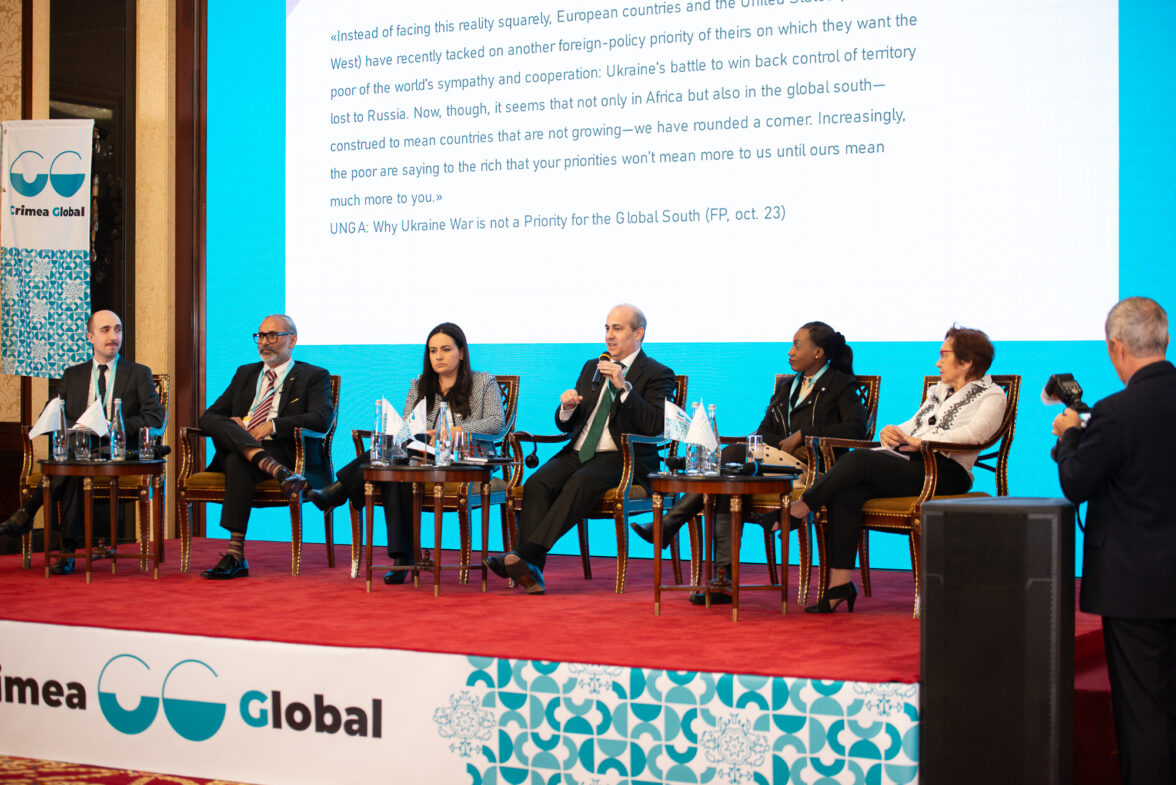REDEFINING THE INTERNATIONAL SECURITY AND DEVELOPMENT ORDERS: UKRAINE’S RESISTANCE AND RECONSTRUCTION, AND SOUTH-SOUTH COOPERATION
The final panel of the day was titled “Redefining the international security and development orders: Ukraine’s resistance and reconstruction, and South-South cooperation”

It was joined by experts from Latin America, Africa, India and Estonia. The participants had the opportunity to discuss the prospects for the development of a sustainable global security architecture, regional cooperation, and possible threats to these processes.
Ivan Klishch, a research fellow at ICDS in Tallinn, moderated and participated in the discussion. At the beginning of the discussion, the expert immediately noted that it is necessary to build a global security system to ensure freedom from fear for humanity. Mr. Klishch emphasized the importance of implementing an exclusively Ukrainian formula for peace, as only Ukraine has the right to determine the conditions for ending the war.
“Communication between Ukraine and the countries of the Global South is important – today we have opportunities here to reach a consensus on security issues,” said Mr. Klishch.
In addition, he believes that reevaluation of many aspects of the international order is inevitable to ensure the interaction of security and development.
Armi Channa, Founder and President of the India-Ukraine Chamber of Commerce and Industry (IUCCI), also addressed the guests with his own understanding of Ukraine’s cooperation with the Global South countries. The entrepreneur shared the story of negotiating joint initiatives with Ukrainian diplomats in India and expressed gratitude to the entire Ukrainian nation for their inspiration to be resilient.
Brenda Estefan, an international relations analyst from Mexico to participate in the international conference. The expert expressed her support for Ukraine in establishing closer relations with the countries of the Global South and encouraged both sides to continue more active cooperation in opposition to Russia’s attempts to find partners in the region.
“Who would have thought that not only the West, but also the countries of the Global South would unite with Ukraine in the fight against the enemy? However, this should not be surprising – we all have something to lose if Russia wins, which the entire world should not allow,” said Brenda Estefan.
At the same time, she reminded that narratives about Ukraine’s relations with the states of mentioned region should not be based on unity against the enemy – Russia – but on the fundamental importance and benefits of interaction between the two parties without reference to third actors.
Mario Pereira Garmendia, associate professor at University of Navarra School of Law, also joined the discussion. The panelist emphasized the impossibility of reaching a peace agreement in the current circumstances, as it contradicts the interests of both Ukraine and the global security structure.
“No one tries to find a common language with a criminal when he robs, rapes or maims – why should Ukraine seek ways to reconcile with Russia?” the participant added.
He reminded the audience of the importance of not only drafting new international legal documents, but also developing effective systems for their implementation.
“All declarations, charters, and statutes embody the belief of states in the dignity of human life as a value for the sake of which the institution of the state exists. It is the duty of every country to ensure the well-being of its citizens, while not encroaching on the sovereignty and, as a result, the well-being of the population of other states. Russia cynically violates these established norms,” the expert said.
He also emphasized that Russia’s war against Ukraine has consequences and threats for the whole world, as it is difficult to predict the next victim of the aggressor state – it could be any country.
Roselyne Ndisi Obala, political editor at Nation Media Group from Kenya, also took part in the panel discussion. She expressed concern about future economic trends in the Global South, as Russia’s war against Ukraine undermines international relations stability.
“Kenya is thousands of kilometers away from Ukraine, but we are experiencing the catastrophic consequences of Russia’s hostile actions on a daily basis. We and other states in the region are experiencing security implications within the country as a result of rising food prices and frequent demonstrations by the population dissatisfied with this. Global food security has a direct impact on the development of the Global South, and without ending the war and establishing peace, it will not exist,” said Roselyn Ndisi Obala.
The closing remarks of the panel discussion were made by the former Ambassador of Argentina to Ukraine and General Secretary of the Argentinian Council of Foreign Relations (CARI), Lila Roldán Vázquez. The conference participant expressed her belief in the fundamental similarity of values between Ukrainians and Argentinians, and recalled Argentina’s historical support for Ukraine in 1921, when the Latin American country recognized its independence.
“Russia’s full-scale invasion in February 2022 disrupted the entire international order we are accustomed to. The Russian Federation has opened a Pandora’s box, sending a signal to other aggressor states to attack countries they perveive as weaker and inferior,” said Ms. Lila Roldán Vázquez.
She also drew attention to the lack of foresight in Russia’s actions. Seeking to intimidate the West by attacking Ukraine, the aggressor state is on the contrary witnessing increased militarization and expansion of NATO.
“We have to do everything in our power to keep the Russian-Ukrainian war on the front pages of the world news. Ukraine shows us where the line between good and evil is. This war also encourages us to accelerate the development of relations between the countries of the Global South and Ukraine. We have all the opportunities for cooperation, and therefore the actors in the region should extend a helping hand to Ukraine today,” said Lila Roldán Vázquez, General Secretary of the Argentinian Council of Foreign Relations (CARI).